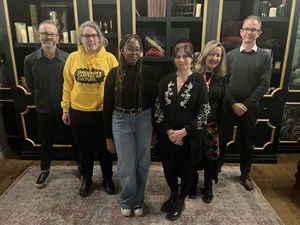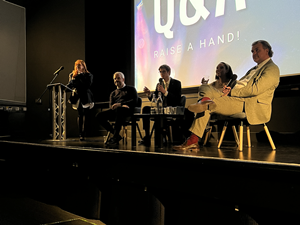Creative Network - Sheffield
South Yorkshire Cultural and Creative Industries Network
Monday 27 June 2022
Showroom Workstation - Sheffield
“Every city and every town deserves a carnival because it really can drive the economy all year round.”
These were the words of Claudette Whittingham, Executive Director at the UK Centre for Carnival Arts (UKCCA), who shared her thoughts on the impact of carnivals in towns and cities. “Carnivals are far more than a parade. I've started to challenge anyone to ‘carnivalise’ absolutely anything and everything. That’s my ambition,” she shared.
Also discussing the importance of festivals at the June SYCCIN event was Rhonda Allen, a festivals and carnival expert, who said that festivals were proven to regenerate cities and attract tourism - nationally, regionally and internationally. She added they were also important for skills development, the employment of artists, and providing apprenticeships in colleges and universities. Rhonda said that they also influence increased use of public transport, retain hotel and venue usage and provide income generation via uplifts of spending in local shops and facilities.
There’s a huge social aspect too, encouraging inclusion and diversity and the creation of costume design, Rhonda added. “Anybody that gets involved in carnivals always has a smile on their face. I grew up with carnivals and they bring a sense of fulfilment. A carnival can create a sense of place - a destination.”
The duo called for South Yorkshire to “go for it” and host a carnival of its own, which was met with rapturous applause from the audience.
Clare Stewart, Interim CEO at the internationally renowned DocFest which was concluding its recent stint at the Sheffield Showroom in the days following the SYCCIN event, said: “Coming into this festival, I feel one of the things that is incredibly exciting is the fact that it is genuinely a festival that connects the local with the international and that bridge is a bridge that I think from investment standpoint is extremely interesting.”
The documentary film festival puts Sheffield on the map alongside other major cities across the globe and is both industry and public facing, shared Clare. This allows new projects to be seen by decision makers and means it’s a place where “projects are birthed,” she reflected.
Clare gave a plethora of examples showcasing how and where documentary projects have been picked up from DocFest, allowing them to be created and distributed. That’s because of the wide range of compelling and high quality opportunities that exist at the festival, she explained. For example, at this year’s DocFest, commissioners for all UK TV channels attended a panel discussion to talk about their focus in the coming years and how filmmakers and producers can put together projects aligned to these objectives. The festival also provided a chance for cinema partners to re-engage with the industry post-pandemic too, she added
Talking about the importance of having a varied and high quality programme, Clare said: “This year we have about 135 films. A lot use more innovative spaces such as VR and augmented reality now,and other mixed reality services. There’s the real cutting edge of filmmakers who are artists working with technology to tell their stories.”
DocFest has returned to being in-person this year after a purely online offer and then a hybrid festival over the last two years due to the Covid-19 pandemic. She said: “It’s about impact over scale. There’s a constant dialogue about ‘bigger is better’ but what we’re seeing this year is because we’ve moved the needle again back to being in-person, we will have different numbers but higher engagement.”
“I feel like there's a receptiveness here that adds interest and desire to see this festival in Sheffield. It really delivers more in terms of social impact,” concluded Clare.
During a panel discussion hosted by Caroline Cooper Charles, CEO of Screen Yorkshire, Alex Deadman, of Tramlines Festival, talked about the importance of including communities in a festival, such as the fringe events that Tramlines now hosts, to ensure it was owned by the region.
Sara Unwin, from Off The Shelf, said the literature festival had already made the move from local to regional. “It started as a very small festival, with about 20 free events in libraries, and grew to about 200 events over three weeks in multiple venues in 2019,” she explained.
“We realised there was something we could build on here. We've got a reputation, we've got expertise, and we could grow out of Sheffield and truly be a festival in South Yorkshire. So we had a bid to the Arts Council back in 2020 to do a pilot last year, which was looking at the festival model and how that could run in Rotherham, Barnsley and Doncaster. That went really well. We're now looking at the community and the grassroots work that we want to do throughout South Yorkshire. We’ve got some great partners on board and will roll-out this year. It’s starting small but it will build until people across South Yorkshire recognise Off The Shelf as being their festival and not just something that happens in a big city.”
Sara said that it was important to always challenge what is available at festivals, so they “don’t go stale.” The way that Off The Shelf have done this is by inviting guest curators to be involved, as well as working closely with councils and a wide range of partners to make it as refreshed as possible.
Partnerships was a huge theme of the discussion. Claudette added that the success behind any large-scale event was about involving businesses and community organisations at every stage to ensure they are involved and “get what they need” out of the partnership. “It's about having those conversations with partners to make sure that you're satisfying the needs of the right audience, but also the partners interests.”
Alex added that a challenge facing successful festivals was ensuring they are kept to their real purpose. He explained: “You have to kind of extinguish the flame of this demand for constant growth. Because you don't necessarily need constant growth for something to become bigger and bigger, bringing in more revenue and more people.
“What we're trying to do now is to make sure that we're empowering Sheffield and keeping all of the good things that happen at the fringe events outside of Hillsborough are also supported. And we’ve launched a trust for this reason.”
South Yorkshire Mayor Oliver Coppard also updated the audience about his ambitions for the cultural and creative industries sectors in the region.
Showroom Membership
Show us some love by joining our club >
Support Us
We welcome your support. Find out how you can help us >


